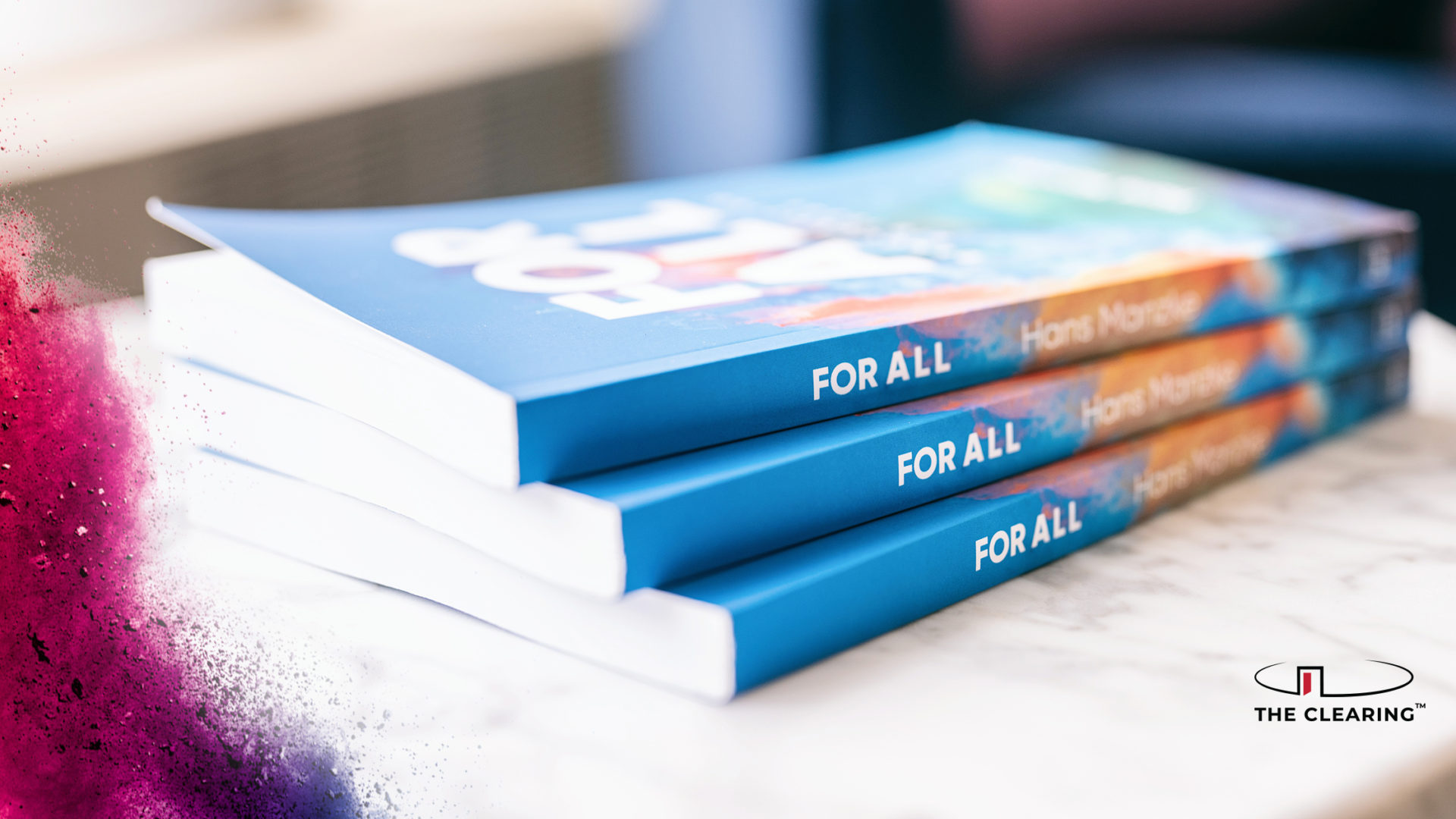Tell us a little bit about yourself.
I was born and raised in San Antonio, TX as the child of high school teachers. My mom taught Spanish and my dad taught calculus and computer science. Growing up in that environment I felt really confident that my parents could answer any question I could come up with. This in turn fed my natural curiosity about the world and people around me. This was the beginning of the thousands of ‘why’ questions I’d ask throughout the course of my life.
When I was finishing high school and thinking about college, I wasn’t sure what I wanted to study and pursue. My interests were as diverse as the questions I’d ask my parents as a child – thus, I realized pretty quickly that a liberal arts education was right for me. It would allow me to sample my different interests in an environment that empowered my curiosity. I graduated from Middlebury College with a dual degree in English and History.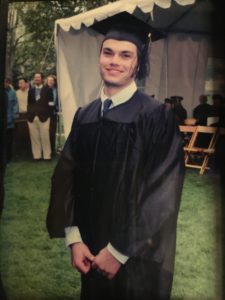
After graduation, I followed my interest in the world of writing and got my first job in journalism followed by a second position in publishing. I learned almost immediately that those positions and environments didn’t play to my unique strengths. Thankfully, I was introduced to the world of management consulting via a childhood friend and started my career at Touchstone Consulting (founded by John Miller and Chris McGoff). It was there I learned and grew for 8 years before joining The Clearing almost 7 years ago.
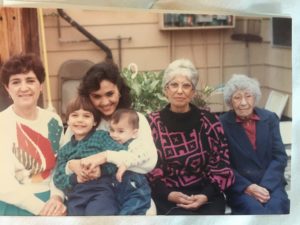
Did you always want to write a book?
Yes! From a young age, I have always wanted to write a book. I’ve always been drawn to the idea, but struggled with the enormity of the task – it just felt too big. Where would I begin? What’s the first proverbial thread I should pull as an author in what feels like a three-foot-wide ball of yarn?
What made you finally settle on an idea and start writing?
Through The Clearing, I had a connection with a Georgetown University book writing seminar called The Creators Institute. It’s a year-long program that supports authors going from a loose idea to holding their published book in their hands in twelve months’ time. Creators Institute Founder Eric Koester helped me get clear on what to write about through a series of exercises and ideation sessions.
For me, what rose to the surface was my lifelong proclivity for big ideas, including some I’d been introduced to at The Clearing, like The PRIMES (John Wiley & Sons, Inc., copyright © 2012). I am fascinated with concepts and ideas that help people engage with complex topics in an accessible way. To explore this idea, I researched the frameworks and concepts, tested my assumptions, and landed on a way to make big ideas accessible For All, regardless of where they are in their careers or their socioeconomic backgrounds.
What’s a major takeaway for your readers?
My hope is that after reading my book, readers will have a much deeper insight into themselves and access to an array of ideas that they use to better themselves and the world around them. This book is about opening up new avenues for self-awareness. Regardless of what your next personal or professional endeavor is, the most powerful starting point is getting to know yourself. Using these big ideas, you can create the reality you want to experience in your own life. I’ve personally deployed each of the big ideas I describe in my book on my own self-awareness journey, and I’m hoping my readers will find value in them as well.
Where are you in your own self-awareness journey?
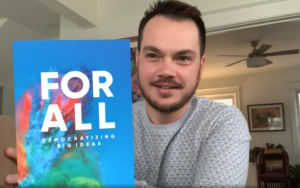 I’m far enough into this journey to be able to look back and see some growth and breakthroughs, as well as some dead ends that I had to navigate. I can also see decades more work in front of me, and that excites me. What I’ve learned about myself and observed in others is that true self-awareness is a life-long journey.
I’m far enough into this journey to be able to look back and see some growth and breakthroughs, as well as some dead ends that I had to navigate. I can also see decades more work in front of me, and that excites me. What I’ve learned about myself and observed in others is that true self-awareness is a life-long journey.
For me, a turning point was realizing that I had become quite adept at doing certain things in a certain way, and was having trouble adapting and evolving. I built my professional reputation by being able to connect with people deeply, and by using those strong personal relationships to deliver high-quality outcomes. It worked well for me, but those connections aren’t always available depending on job, team, or focus area. Effectively, I’d discovered a big personal blind spot. The crux of the matter was that I needed to be brutally honest with myself about the person I was versus the person I wanted to be.
Do you have any advice for someone looking to become more self-aware?
Everyone’s starting point and journey are different.
For me, the journey began with radical self-honesty and candor. Holding up the self-image I project out into the world vs. what I actually know to be true about myself allowed me to see where there was congruence and where there was a lack of congruence. That’s one tool anyone can use.
Some of the big ideas I discuss in the book are ones I’ve used as major stepping stones on my own journey. Those concepts can push boundaries on how we think about ourselves, especially in our own environments, and force us to consider new versions of the future that hold new possibilities.
What is one concept or method you talk about in your book that you are most passionate about?
That’s a tough question – I have passion and energy for every big idea in my book. However, the two ideas that I’m digging into the most right now are Imposter Syndrome and the Dunning–Kruger effect. Both ideas feel more critical now than ever before.
- Imposter Syndrome*: This big idea is pretty universal. It’s a feeling in which an individual doubts their skills, talents, or accomplishments and has a persistent internalized fear of being exposed as a “fraud.” In my book, I explain my own experience with Imposter Syndrome, and share insights on the topic from some big names that you’ll probably recognize.
- Dunning-Kruger Effect*: The basic idea is that the people who know the least about something are the most confident in their abilities and knowledge. Those that know the most about something grasp the enormity of how much they don’t know – thus, they paradoxically believe themselves to be less informed.
Any advice for anyone looking to write their own book?
Just begin. You’ll surprise yourself.
Looking back on my own book-writing experience, I’m a big believer in the time-bound process, as well as external accountability. I needed the word count goals, deadlines, and commitments to my editors – I don’t know if I would have been able to complete the book without those things. While that’s not the case for everyone, I needed the structure to pair with my natural adaptability.
If you are interested in writing a book, be honest with yourself on what it takes, and make sure you have the necessary energy. It’s no small thing to see it to the finish line. For me, the best part is now – getting to meet and learn from people who have read the book and can expose me to their own big ideas and experiences.
Where can you get a copy of the book? 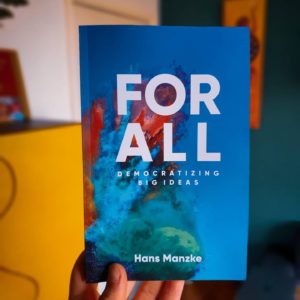
You can learn more about For All: Democratizing Big Ideas and purchase a copy of the book by visiting amazon.com!
*(Clance, P. R., & Imes, S. A. (1978). The imposter phenomenon in high achieving women: Dynamics and therapeutic intervention. Psychotherapy: Theory, Research & Practice, 15(3), 241–247.)
*(Kruger, J., & Dunning, D. (1999). Unskilled and unaware of it: How difficulties in recognizing one’s own incompetence lead to inflated self-assessments. Journal of Personality and Social Psychology, 77(6), 1121–1134.)
